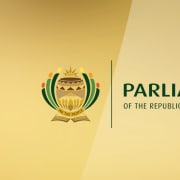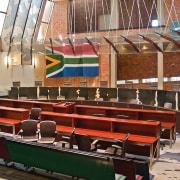|
Getting your Trinity Audio player ready...
|
Image: Flickr/GovernmentZA
Corruption Watch (CW) and the Council for the Advancement of the South African Constitution (Casac) have joined, as amici curiae, Public Protector Busisiwe Mkhwebane’s application to have Parliament’s rules for the removal of the head of a Chapter 9 institution, declared unconstitutional. The two organisations are supporting the inquiry into Mkhwebane’s fitness to hold office.
Mkhwebane is questioning the recently adopted removal rules that allow the appointment of an independent panel of experts, including a judge, to decide whether or not she is fit to hold office. Her argument is that Parliament may not outsource its constitutional duties to the judiciary as it breaches the principle of separation of powers.
In their heads of argument, CW and Casac said that, to ensure the effectiveness of the Office of the Public Protector, “its occupant must unequivocally demonstrate the independence, credibility, impartiality and competence that inspires confidence and trust from the public it ought to protect.”
They said that before Mkhwebane took office in 2017, there was only one time when the courts found reason to criticise the institution – but during the tenure of the incumbent, she “has come under trenchant and repeated criticism from our courts in a series of judgments which, inter alia, have accused her of acting with bias, committing acts of misconduct or demonstrating incompetence”.
Mkhwebane has tried twice before to interdict the parliamentary enquiry from proceeding, with both applications being dismissed. She has now, “in a last-ditch attempt”, turned to the Constitutional Court directly.
But in October 2020 the Western Cape High Court noted that the removal rules, are “principally and constitutionally in the public interest” and warned that courts “should not lightly interfere with such processes unless an applicant has demonstrated exceptional circumstances which… the applicant has failed to do”.
This was echoed by National Assembly (NA) Speaker Thandi Modise, the first respondent in the case. She argued that because the president and NA have been assigned, in terms of the Constitution, the power to determine the fitness of a person to continue to hold the office of the Public Protector, a court should not get involved.
Amici’s contributions are relevant to the case
The evidence and submissions by Casac and CW will be of relevance to the case because, they said, none of the parties have indicated that they will deal with the following matters:
- an overview of the Office of the Public Protector, its independence and why such bodies must nevertheless be accountable to the NA;
- a parliamentary law perspective on why the NA is the appropriate body to hold Chapter 9 Institutions accountable;
- a summary of certain findings in additional court cases revealing the bias and further serious acts of misconduct and incapacity by the current public protector and which impacts on the standing, credibility, independence, competence and effectiveness of the Office of the Public Protector;
- comparative research on ombuds in foreign and international law demonstrating that no other jurisdiction contains such detailed procedural safeguards as found in the removal rules; and
- research on international best practice on the removal of ombuds.
However, Mkhwebane’s legal representative Advocate Hangwi Matlhape said that the two organisations added no value to the matters under scrutiny.








